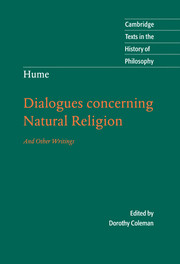Book contents
- Frontmatter
- Contents
- Acknowledgments
- Introduction
- Chronology
- Further reading
- Note on the text
- List of abbreviations
- DIALOGUES CONCERNING NATURAL RELIGION
- OTHER WRITINGS
- From Hume's memoranda
- Fragment on evil
- Letter to Francis Hutcheson, March 16, 1740 (extract)
- Letter to William Mure, June 30, 1743 (extract)
- Letters to Gilbert Elliot (extracts)
- From The Natural History of Religion
- Selections from Bayle
- Index
- Cambridge Texts in the History of Philosophy
Letter to Francis Hutcheson, March 16, 1740 (extract)
Published online by Cambridge University Press: 05 June 2012
- Frontmatter
- Contents
- Acknowledgments
- Introduction
- Chronology
- Further reading
- Note on the text
- List of abbreviations
- DIALOGUES CONCERNING NATURAL RELIGION
- OTHER WRITINGS
- From Hume's memoranda
- Fragment on evil
- Letter to Francis Hutcheson, March 16, 1740 (extract)
- Letter to William Mure, June 30, 1743 (extract)
- Letters to Gilbert Elliot (extracts)
- From The Natural History of Religion
- Selections from Bayle
- Index
- Cambridge Texts in the History of Philosophy
Summary
Editor's note: Francis Hutcheson (1694–1746), Professor of Moral Philosophy at the University of Glasgow and a popularizer of Shaftesbury's thought in Scotland, helped foster a more enlightened attitude among the Scottish clergy. Hume and Hutcheson shared the Shaftesburean conviction that moral judgments do not convey factual information but express disinterested emotions. Further, they both believed that moral sense is independent of religious belief. Hume sought Hutcheson's advice in preparing the third volume of his Treatise of Human Nature for publication. Hutcheson was very helpful to Hume in this regard, but four years later their disagreements about religion led Hutcheson to oppose Hume's candidacy for a faculty appointment at the University of Edinburgh.
Dear Sir:
… I must consult you in a point of prudence. I have concluded a reasoning with these two sentences. When you pronounce any action or character to be vicious, you mean nothing but that from the particular constitution of your nature you have a feeling or sentiment of blame from the contemplation of it. Vice and virtue, therefore, may be compared to sounds, colours, heat and cold, which, according to modern philosophy, are not qualities in objects but perceptions in the mind: And this discovery in morals, like that other in physics, is to be regarded as a mighty advancement of the speculative sciences; though like that too, it has little or no influence on practice. Is not this laid a little too strong?
- Type
- Chapter
- Information
- Hume: Dialogues Concerning Natural ReligionAnd Other Writings, pp. 113 - 114Publisher: Cambridge University PressPrint publication year: 2007

